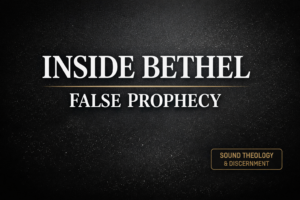⏱️ Estimated Reading Time: 8 min read
Editors note: The purpose of this series is to help our readers think through what discipleship is and how to embrace the Cross of Christ in all of life.
- Today Dave opens our series by looking at learning the key to true contentment and joy in the Lord.
**************************************************
 Phil. 4:12–13, “I know how to be brought low, and I know how to abound. In any and every circumstance, I have learned the secret of facing plenty and hunger, abundance and need. I can do all things through him who strengthens me.”
Phil. 4:12–13, “I know how to be brought low, and I know how to abound. In any and every circumstance, I have learned the secret of facing plenty and hunger, abundance and need. I can do all things through him who strengthens me.”
Financially tough times, such as economic recession, put people under intense pressures. Those pressures can reveal hairline cracks in our characters that would have been invisible in more comfortable conditions. As the visible props on which we often lean crumbles, people are forced to face the truth that sources from which we seek satisfaction and security are surprisingly fragile.
Tight budgets in crunch times pose two temptations for Christians and non-Christians alike: anxiety and discontent. Anxiety frets over the question “Will I have enough to survive, to meet my family’s basic needs?” To such fear anxiety typically answers, “Maybe not,” or even “Probably not.” So Anxiety tends to close its fist around what little it has, afraid that hands that give too freely will end up empty. Discontent asks, “Do I have enough to make me happy, to satisfy my desires?” To that question discontent always answers, “No, not enough, not yet.” Therefore, discontent, like anxiety, keeps a tight grip on its treasures, and discontent resents the fact that it doesn’t have even more.
Content with Where I Am and What I Have, but Not with Who I Am—Yet!
In Philippians 4:12 Paul starts his list of the extremes of experience in which he has found contentment with a contrast of opposites that are not limited to cash: “I know how to be brought low, and I know how to abound.” Being “brought low” is not merely living below the poverty line. It has more to do with status than with income. This was clear when Paul used the same word in chapter 2 to describe Christ’s self-humbling when, instead of exploiting his equality with the Father, he became a human being, took a servant’s status, “made himself low,” and submitted to death on a cross (Phil. 2:6–8).
Paul has a purpose in beginning where he paints the spectrum of experience in which he finds contentment. Because Christ has so humbled himself to redeem Paul’s life and transform Paul’s heart, the apostle is content not only to forgo funds but also to forfeit honor and to occupy a low place where others fail to notice or respect him. He practices the counsel that he has given his Philippian friends, humbly counting others more significant than himself.
Sometimes being content in a situation in which nobody appreciates you is as hard as being content on a tight budget. Do you know people who have more than they need materially, but still work and overwork because what drives them is not the size of their salary but the acclaim of the industry? Or people who want an office in the church rather than quiet opportunities to serve, so that others will recognize their abilities? Is that driven honor-seeker you? Or can you sincerely sing this very countercultural hymn of Christian humility:
I would not have the restless will
That hurries to and fro,
Seeking for some great thing to do,
Or secret thing to know;
I would be treated as a child,
And guided where I go.
I ask thee for the daily strength,
To none that ask denied,
A mind to blend with outward life,
While keeping at thy side,
Content to fill a little space,
If thou be glorified.
If you find in yourself a “restless will that hurries to and fro, seeking for some great thing to do or secret thing to know,” Paul would show you a higher path, a path of lowliness in which you will be “content to fill a little space,” as long as God is glorified—that “now as always Christ will be honored in my body, whether by life or by death” (Phil. 1:20).
With the next pairs in verse 12—“facing plenty and hunger, abundance and need”—Paul turns the spotlight directly on material resources. He is content with what he has. He reduces things to the bare essentials, to the question whether there is food on the table. The ESV’s “facing plenty” represents a Greek verb that conveys eating one’s fill, consuming food to the point of complete satisfaction. In effect, Paul says, “I can be stuffed or starved; either way, I am content.”
The secret of Christian contentment not only enables us to receive small gifts from our Father’s hand with gratitude. It also empowers us to receive great wealth from our Father’s hand without having our hearts stolen away from the Giver by His gifts. Especially in times of material abundance, you must coach yourself and cultivate in yourself the wise perspective on reality that God’s Word provides. When tempted to rest your sense of security in your investments, hear Jesus say to you, “One’s life does not consist in the abundance of his possessions” (Luke 12:15). Heed God’s wise counsel: “Do not toil to acquire wealth.… When your eyes light on it, it is gone, for suddenly it sprouts wings, flying like an eagle toward heaven” (Prov. 23:4–5). You must “keep your life free from love of money, and be content with what you have,” because God has promised what funds can never offer: “‘I will never leave you nor forsake you.’ So we can confidently say, ‘The Lord is my helper; I will not fear; what can man do to me?’” (Heb. 13:5–6). This ever-living, never-leaving Lord is “Jesus Christ … the same yesterday and today and forever” (13:7). The secret of contentment that Paul has learned and wants to teach is to be “at home” with our place, whether low or high, and “at home” with our goods, whether few or many.
To get a complete and balanced understanding of what Paul means by contentment, we must recall another perspective that Paul presented earlier in the epistle. Without that perspective, we will confuse Christian contentment with a mellow, laid-back, “whatever” approach to life. As we have seen, Paul is anything but complacent or unmotivated! Paul can take or leave honor or dishonor, full meals or famines. His joy and contentment are not dependent on the living conditions that his loving Father has ordained for him. But Paul cannot, will not, be complacent in his pursuit of the great prize on which his heart is set. He is not content—yet—with who he is. He has not yet reached the goal and received the full prize for which he runs with all his might: “that I may know [Christ] and the power of his resurrection, and may share his sufferings, becoming like him in his death, that by any means possible I may attain the resurrection from the dead” (Phil. 3:10–11). Paul knows his Savior and rests in Jesus’ righteousness, but these tastes of redeeming grace have only whetted Paul’s appetite for the full feast awaiting him at the Lord’s return. Paul presses on for “the prize of the upward call of God in Christ Jesus” and invites all who would be mature to join his lifelong quest (3:12–15).
God’s Word infects us with a holy discontentment. There are things in life worth longing for and striving for with all our might. Food and clothes and technology are not those things. The treasure that is not yet fully in our grasp, that should still stir our discontentment, is the fullness of God’s grace in Jesus. If you trust him, your sins are forgiven and His righteous record is yours. His Spirit has begun a good work in you (Phil. 1:6), renewing you from the inside out. But the best is yet to come! Be content with where you are and what you have, but discontent with who you are—so far!




